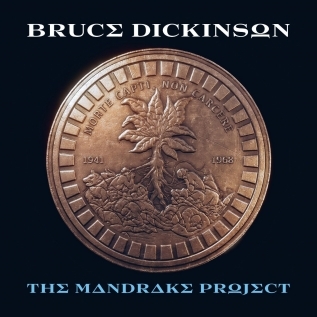Cards on the table, everybody wanted to love the new album unconditionally, because it had to be epic from head to toe but ‘The Mandrake Project’ could disappoint those who have forgotten the history of Bruce as a solo artist through the years.
Having tasted the freedom of a lone wolf, Bruce Dickinson inevitably parted ways with IRON MAIDEN and started exploring darker, much more experimental music territories. It took him three attempts to finish 1994 ‘Balls to Picasso’ and a huge part of that was played by a certain Roy Z, a talented guitarist and producer who would later save other people’s careers as well.
By the mid 90’s it became quite evident that being the ex-vocalist of the biggest heavy metal band and recording alternative rock records would not automatically turn you into the next Peter Gabriel. Your old fans are not interested, and the new audiences consider you uncool.
In time Bruce would rediscover his passion for metal. This time it’s Roy Z again, but also another ex-Maidenite, Adrian Smith who would back him up in recording ‘Accident of Birth’. Some call this album the best maiden album of the 90’s. Even the album’s cover featured a creature called Edison, Bruce’s own take of the MAIDEN mascot Eddie.
“Bruce would make a country and western album if he thought it would sell “– proclaimed Bruce’s old sparring partner Steve Harris at the time. ‘Chemical Wedding’ (1998) was a great heavy rock album and the final straw for Bruce and Adrian to return to the mothership. That happened almost 25 years ago.
‘The Mandrake Project’ itself takes 14 years. The album had to overcome the heavy touring schedule of Iron Maiden, throat cancer and pandemic.
Its development appears to be rather like building an Egyptian pyramid: slow, painful, precise and with a hell of a point at the end.
That hell of a point is called ‘Sonata (Immortal Beloved)’ – the most moving and impressive piece of music Dickinson has ever recorded outside IRON MAIDEN. He had been sitting on it for the last 25 years and even considered removing it from the final version of the album. It’s a 10-minute stream-of-consciousness meditation on death, described by its creator as a twisted version of The Sleeping Beauty.
And that’s not all. Immortal Beloved (German: Unsterbliche Geliebte) is the addressee of a love letter which composer Ludwig van Beethoven wrote in 1812. It was found in the composer’s estate following his death. Impressed by this story, Roy Z stayed up all night exploring the chord changes to the Moonlight Sonata and came up with the backbone of the track.
‘Face in the Mirror’ and ‘Shadow of the Gods’ are quite interesting too – while the first one stays somewhere between ‘Man of Sorrows’ and ‘Change of Heart’, the latter almost pick up the main theme of ‘Chemical Wedding’, but at the fourth minute mark it shoots you point blank with a killer riff that sounds like an outtake of BLACK SABBATH’s ‘Dehumanizer’. There’s a nod in the lyrics to Percy Shelley’s ‘Prometheus Unbound’ in ‘Many Doors to Hell’ and it really starts off with a huge GHOST riff.
‘Eternity Has Failed’ is a version of ‘If Eternity Should Fail’ off ‘The Book of Souls’ by IRON MAIDEN. In ‘Rain on the Graves’ one can easily hear and feel the obvious influences by the early Alice Cooper and the eccentric Arthur Brown, but the most extravagant tracks are ‘Resurrection Men’ and ‘Fingers in the Wounds’ – both reassure my initial impression that this new Dickinson album sounds like a darker, deeper version of his 1994 ‘Balls to Picasso’.
We will not, of course, touch the subject of album’s libretto and the comic books, because we’ll be running out of space if we start analysing them. Still, it’s very tempting for me to share a revelation that occurred to me earlier today. I heard the word mandrake for the first time back in 1988, in MAIDEN’s seventh studio album and I haven’t heard it from Bruce since then. Until now, when it is used in the title of his own seventh studio album. I do not know if it is a deliberate move, but I do believe that this is a kind of Ouroboros that perfectly reflects the span of the creative thinking in ‘The Mandrake Project’.

